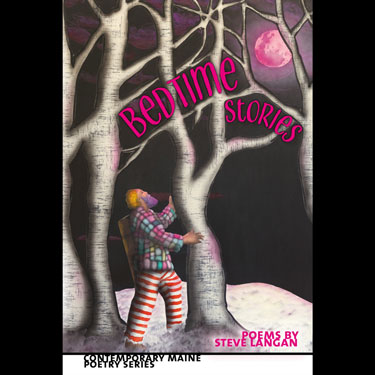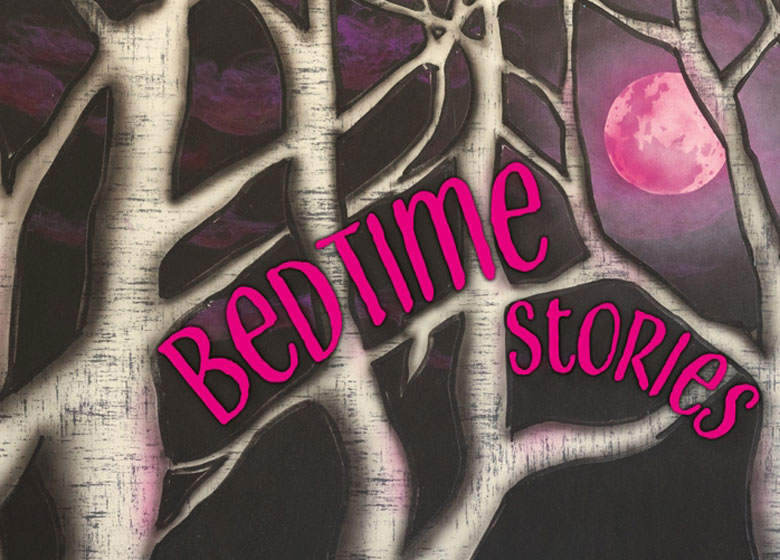Bedtime Stories: Poems by Steve Langan
Littoral Books (2024)
Steve Langan, the author of the poetry collection Bedtime Stories, keeps a residence on Cliff Island. This is helpful to know when you read his book, because the best poem in the collection, for my money, is “Island,” which is helped if you can picture a day visit to a Casco Bay island.

It’s also helpful to know that Langan is an expert in public health administration and a founder of the University of Nebraska Medical Center’s Seven Doctors Project, where healthcare workers use creative writing to deal with their profession’s stresses.
He also holds an MFA in creative writing from the vaunted Iowa Writers Workshop, which might be the most useful background fact when reading his poems.
For these poems can be hard to follow for readers unfamiliar with the poetry workshops. While most of the sentences are quite plainly stated, at the same time, the sense of one thought often does not follow conversationally on the previous thought.
One of the shorter poems, “Modern Man Is Monstrous, Let’s Not Forget,” begins: “Seems like any time I have a minute/to relax here goes somebody all dressed up/on TV talking about the end of time.” These ideas are in themselves quirkily disconnected.
The day’s events are not being narrated conventionally at all. We seem to be wandering around in the mind of the speaker…
But then the next sentence, with no indication of how it fits, says: “I saw a photo of Michel Foucault today.” The poem concludes on how difficult it can be to make a sandwich.
This can be hard to make sense of, for some readers. But it’s not uncommon in the workshops for poets to understand their purpose is to disrupt conventional meaning.
In “Modern Man Is Monstrous,” a way to bring together some conventional meaning is to keep in mind that the dreamlike discontinuities are deliberate, and that Langan has this background in healthcare. Healthcare workers, the poem may be saying, are so busy at their jobs that they hardly have time to make a sandwich, let alone ponder society’s big problems.
“Island,” a longer poem, has this same dreamlike, discontinuous form and atmosphere. The speaker of the poem appears to have invited friends to visit on his island—“please join us, as you are, on the Island.” He (or she) has brought them on a boat whose captain keeps being mentioned, and the friend is pointing out highlights: “There is no such thing ‘sea gull,’ only/varieties of gull.”
The day’s events are not being narrated conventionally at all. We seem to be wandering around in the mind of the speaker who is simultaneously trying to entertain his guests and make important, sometimes ironically stabbing points to and about them.
I refuse to comment on local personalities.
Can’t I just describe for you the placement
of facts and ideologies without these characters,
without including the one who smiles, laments,
insinuates, commiserates? … you know the types.
There’s emotional tension among the unnamed characters (“Don’t nap yet; I said talk to me awhile”). By nightfall, everyone departs.
Toward the end, a few lines disclose what could be a clue to the source of the tension and the need for an island respite: “The pact the captain has made/is if I can just make it to the morning./If we can only make it to tomorrow morning.”
Plainly stated ideas, but where did they come from? Well, the need and desire to just make it to morning are characteristic of grievous ailment. When you put the poet’s health care expertise with it, “Island” seems to be about some fairly well-to-do people—physicians? addicts?—taking a break from harrowing lives, but escaping nothing in their minds.
What sets “Island” apart from most of the rest of Bedtime Stories is that it does not make fun of itself. Most of the rest of the book elicits with relentlessly ironic humor the feeling that life is ultimately a bleak, empty joke, like the trivializing sandwich-making in “Modern Man Is Monstrous.” Instead, “Island” treats postmodern suffering more seriously, probing for actual, substantial personal and social meaning.
Bedtime Stories could be a good introduction to how skillful the often obscure poetry coming out of the workshops can be. Steve Langan, from his vantage point on Cliff Island, is a master of this craft.
Dana Wilde is a former college English professor and newspaper editor. He lives in Waldo County.





